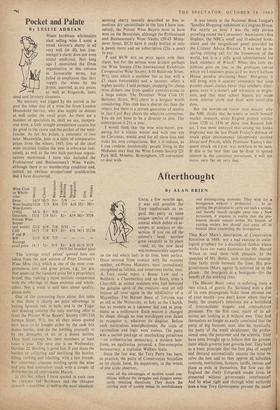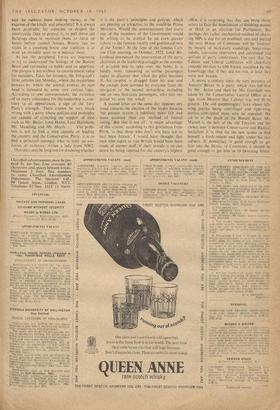Afterthought
By ALAN BRIEN
UNTIL a few months ago, it was still possible for Tory intellectuals to re- gard the party as some unique species of magical animal which defied all at- tempts at analysis or dis- section. If you cut off the animal's head, another grew instantly in its place —and, lo, the new head was immeasurably superior to the old which had, in its time, been perfect. Once severed from contact with the monster mother, ex-Prime Ministers were immediately recogniSed as fallible, and sometimes feeble, men. A Tory could reject a Bonar Law and a Baldwin, a Chamberlain and an Eden, even a Churchill, as misled mahouts who had betrayed the genuine spirit of the creature—and yet still believe all over again in the infallibility of a Macmillan. The Blatant Beast of Toryism was as old as the Monarchy, as holy as the Church, but as modern as a takeover bid' and as prag- matic as a millionaire. Each session it changed its shape, though no true worshipper ever failed to recognise it, whatever its disguise. Before such miraculous amorphousness, the tools of rationalism and logic were' useless. The party was a sacred package of interlocking paradoxes —an authoritarian democracy, a modern heir- loom, an egalitarian pyramid, a free-enterprise bureaucracy, a capitalist Welfare State.
Since the last war, the Tory Party has been, in practice, the party of Conservative Socialism in its classic form. Its supporters, in the words of one acute observer, want all the advantages of modern social con- ditions without the struggles and dangers neces- sarily resulting therefrom. They desire the existing state of society minus its revolutionary
and disintegrating elements. They wish for a bourgeoisie without a proletariat. . . . In re- quiring the proletariat to carry out such a system, and thereby march straight away into a New Jerusalem, it requires in reality that the pro- letariat should remain within the bounds of existing society but should cast away all its hateful ideas concerning the bourgeoisie.
Thus Karl Marx's description of Conservative Socialism in 1848.: not a bad exercise in socio- logical prophecy for a discredited thinker whose works have too many footnotes for Mr. Harold Wilson to read them with pleasure. In the speeches of Mr. Butler, such unspoken assump- tions fairly rattle between the lines. His pro- gressiveness (Marx again) 'is summed up in the phrase: the bourgeois is a bourgeois—for the benefit of the working class.'
The Blatant Beast today is suffering from a rare attack of gastric flu. Surfeited with a diet of its own propaganda (take those phrases out of your mouth—you donl know where they've been), the creature's intestines are a battlefield of irreconcilable slogans and contradictory promises. For the first time, many of its ad- mirers are looking at it without awe. They find themselves no longer so easily convinced that the party of big business must also be, mystically, the party of the small shopkeeper, the profes- sional man, the pensioner and the scientist. They have been brought up to believe that the govern- ment which governs least governs best. They hold as a basic principle that the free play of supply and demand automatically ensures the most re- ceive the best and so they oppose all subsidies, controls, restrictions, licences, tariffs, rations and plans as evils in themselves. But how can the England the Daily Telegraph reader loves be preserved without government interference? And by what right and through what authority does a true Tory G6vernment prevent the smart
and the ruthless from making' money at the expense of the kindly and unworldly? It is always more profitable for someone to despoil the countryside than to protect it, to pull down old buildings than to maintain them, to force up hotels before council houses. Beauty tips no scales in a counting house and tradition is at most an invisible asset on a balance sheet.
At last the peripheral Tories are beginning to try to understand the biology of the Blatant Beast and rationalise us habits and its appetites. The process is not without its entertainment value for outsiders. Take, for instance, the Telegraph's letter column last Monday. where the mysterious process by which the animal evolves its new head is • defended by some very curious logic. According to one correspondent, the existence of so many contenders for the leadership is, con- trary to all appearances, a sign of the Tory Party's strength. 'There cannot be very much wrong with a party whose policies and principles are capable of attracting the support of men such as Mr. Butler, Lord Home. Lord Hailsham, Mr. Maudling and Mr. Heath. . . . The prob- lem is not to find a man capable of leading the country and the Conservative Party: it is to find a principal amongst what is truly an em- barnis richesses: writes a lady from NW2. . Outsiders may be forgiven for doubting whether it is the party's 'principles and policies' which are proving so attractive to the would-be Prime Ministers. Would the announcement that every one of the members of the Government would be willing to be drafted be an even greater tribute to the famous loyalty and gentlemanliness of the Tories? At the time of the famous Carl- ton Club meeting, in October, 1922. Lord Bir- kenhead denounced the intervention of the party chairman in the leadership struggle as the attempt of a cabin boy to take over the helm. It is hardly more reassuring to airline passengers today to discover that when the pilot becomes ill, his co-pilot is dragged from his seat and the cockpit door jammed by everyone from the navigator to the second stewardess, including one or two first-class passengers, who feel im- pelled to seize the wheel.
A second letter on the same day opposes any trend towards the election of the leader because 'the present system is infinitely more fair and more accurate than any method of formal voting.' But that is not all 'a major advantage of this system,' according to this gentleman from Perth, 'is that those 'who don't win have not in fact been beaten.' I would have thought that men who aspire to rule Britain would have been made of sterner stud'. If their morale is so east down by being rejected for the country's highest office, it is surprising that they can bring them- selves to face the humiliation of finishing second or third in an election for Parliament. But perhaps this rather mechanical method of choos- ing MPs is due for an overhaul, too, and instead the next House of Commons will be 'evolved' by means of backstairs soundings, hotel-room cabals, television interviews and calculated late arrivals at party conferences. I'm sure that the Labour and Liberal candidates w ill cheerfully concede election to 630 Tories, sustained by the knowledge that, if they did not win, at least they were not beaten.
It seems a century since the very presence of Aneurin Bevan in a party which was led first by Mr. Attlee and then by Mr. Gaitskell was taken by the Conservative Central Office as a sign from Heaven that Labour was not fit to govern. The old psephologists' laws about left- wing parties being centrifugal and right-wine parties centripetal must now be repealed. We ;ire in at the death of the Blatant Beast. Mr. Martell is the heir of the old Toryism and the choice now is between Conservative and Radical Socialism. It is time for the new leader to find himself a fresh mount and light under his real colours. If democracy is good enough to get him into the House of Commons, it should be good enough to get him to 10 Downing Street.



































 Previous page
Previous page